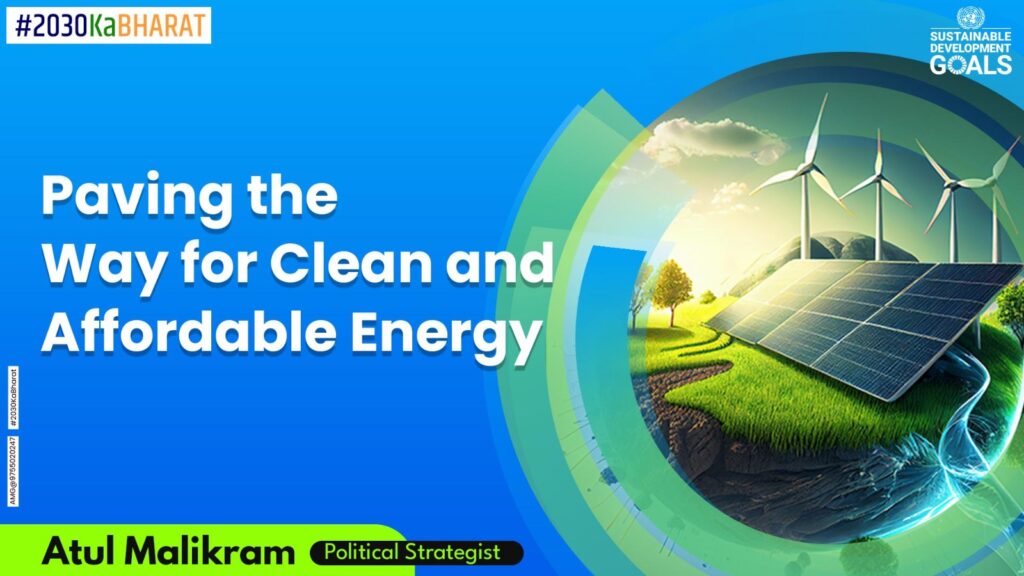The sustainable development agenda, encapsulated in the formidable 2030 Vision, is set to transform nations across the globe. At the heart of this visionary blueprint lies a commitment to achieving the Sustainable Development Goals (SDGs) by 2030. In this article, we delve into the pivotal role of sustainable Energy Access within the Indian context, shedding light on India’s steadfast commitment to the Agenda 2030 and its indispensable connection to the SDG 2030 goals. We’ll explore how sustainable Energy Access is the linchpin to realizing clean and affordable air for all.
Understanding Sustainable Energy Access in India
Defining Sustainable Energy Access and Its Core Tenets
Sustainable Energy Access is the cornerstone of equitable development. It entails providing reliable, clean, and affordable energy to every corner of society while ensuring long-term sustainability. This encompasses the utilization of renewable energy sources, energy efficiency, and inclusive energy policies that leave no one behind.
India’s Current Energy Access Landscape and Associated Challenges Of SDG 2030
India, a rising economic powerhouse, faces its own unique challenges on the path to ensuring Energy Access for all. While considerable strides have been made in electrifying rural areas, disparities persist. Remote regions still grapple with sporadic power supply, hindering economic progress and quality of life. Additionally, dependency on conventional energy sources remains high, contributing to environmental degradation.
The Imperative for Transition to Sustainable Energy Access For SDG 2030
Recognizing these challenges, India is at the crossroads of transformation. The need for transitioning to sustainable Energy Access has never been more urgent. This entails a paradigm shift towards renewable energy sources such as solar and wind power, coupled with innovative solutions that make energy both cleaner and more affordable.
The Role of 2030KaBharat in Sustainable Energy Access
2030KaBharat: A Catalyst for Change
2030KaBharat, a visionary initiative, is poised to play a pivotal role in advancing sustainable Energy Access in India. Rooted in the Agenda 2030 and the SDG 2030 goals, this ambitious endeavor aims to harness the power of clean and affordable energy to drive socio-economic progress while safeguarding the environment.
Key Strategies for Achieving Sustainable Energy Access
1. Renewable Energy Integration
One of the key strategies involves a massive push for renewable energy integration. Solar power, in particular, holds tremendous potential in a sun-drenched country like India. Investments in solar infrastructure, coupled with incentives for solar adoption at the individual and industrial levels, can accelerate the transition to cleaner energy.
2. Energy Efficiency Measures
Enhancing energy efficiency is another critical aspect of sustainable Energy Access. Implementing energy-efficient technologies, improving grid management, and promoting energy conservation practices can significantly reduce energy wastage and costs.
3. Inclusive Energy Policies
Inclusivity is paramount. Policies must be formulated to ensure that marginalized communities, remote villages, and underserved regions have equal access to clean energy. Financial incentives, subsidies, and community-driven energy projects can bridge the access gap.
4. Public Awareness and Education
Raising public awareness is crucial. Educating citizens about the benefits of clean energy, energy conservation, and the long-term advantages of sustainable practices can foster a culture of responsibility and participation.
Challenges and Barriers Of SDG 2030
The Impact of Climate Change on Energy Access Sustainability
Climate change poses a formidable challenge to sustainable Energy Access. Rising temperatures, extreme weather events, and shifting climatic patterns can disrupt energy supply chains. Hence, resilience and adaptation strategies must be integrated into energy planning to ensure uninterrupted access even in the face of climate-induced challenges.
Conclusion
Sustainable Energy Access is the linchpin that binds India’s commitment to the Agenda 2030 and the SDG goals. As India forges ahead, 2030KaBharat emerges as a beacon of hope, offering a strategic roadmap towards a future where every Indian enjoys clean and affordable energy access. By implementing key strategies, addressing challenges, and fostering a sense of collective responsibility, India can truly transform its energy landscape and contribute significantly to the global sustainability agenda. In this journey, sustainable Energy Access is not just a goal; it’s a fundamental right and a catalyst for a brighter, cleaner, and more equitable future.
